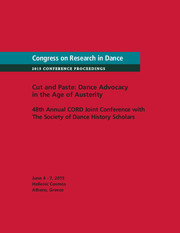Article contents
Endorsing the Self: Embodied Improvisation in Prison Arts Programs
Published online by Cambridge University Press: 23 September 2014
Abstract
Michel Foucault, in Discipline and Punish, outlines a historical shift from punishment as public spectacle to punishment as “the most hidden part of the penal process.” Examining the resultant changes, he recognizes the quieter, psychological control and bodily supervision that have replaced public torture in our system.
I observe this control of incarcerated individuals and then correlate it with terms that Danielle Goldman uses to describe dance improvisation: continued confrontation with constraint(s). She advocates that the practice of freedom, through improvisation, is a “mode of making oneself ready for a range of ... situations,” and so is politically and socially powerful.
Citing multiple prison arts programs, I conclude that embodied improvisation both theoretically and practically addresses forces of oppression and confinement within the prison system by offering moments of creative self-direction and non-hierarchal interaction. I render this unique application an ideal artistic and actionable response to the framework of captivity.
- Type
- Research Article
- Information
- Copyright
- Copyright © Sarah Genta 2014
References
Works Cited
- 1
- Cited by


